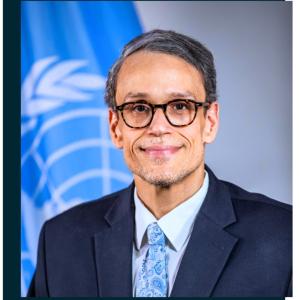United Nations Resident Coordinator Statement at The State of World Population Report Launch and Commemoration of World Population Day 2024
RC Speech
- Honourable Ministers and their representatives here present,
- Honourable Secretary General and Head of Civil Service
- Lord Mayor of Kanifing Municipal Council -Ahmed Talib Bensouda
- Lord Mayor of Banjul – Madam Rohey Malick Lowe
- Development partners and members of the diplomatic and consular corps,
- Heads of UN Agencies,
- Senior Government officials,
- Members of the press,
- Ladies and gentlemen,
- Distinguished Guests
Today, we gather to celebrate the launch of the State of World Population Report and commemorate World Population Day in The Gambia. This year's theme, "Counting Everyone: Delivering for All," underscores the critical importance of inclusive data in shaping our future. This event marks an important opportunity to reflect on our achievements and renew our commitment to the principles guiding population and development. It also provides us with a unique opportunity to reflect on our national achievements, particularly following our recently concluded national population and housing census, with a special focus on Sexual and Reproductive Health and Rights (SRHR).
For The Gambia to continue progressing and achieving the SDGs, it is essential that we count and recognize every individual, no matter their location or identity. As stated by the UNFPA Executive Director Dr Natalia Kanem, in her World Population Day statement, "our journey towards reducing inequality, fostering peace, and nurturing prosperity hinges on our commitment to inclusivity. When people are uncounted, they become invisible, and as a result, they are often deprived of essential services. This invisibility can mean that a young girl in a remote village doesn't receive necessary healthcare, an elderly woman with a disability is left without support during crises, or a newborn in an isolated community is denied birth registration, which is crucial for their protection and rights."
Ladies and gentlemen, As we mark and reflect on 30 years of the ICPD agenda, significant progress has been made in women's access to reproductive care, reduction in maternal mortality, and strides in gender equality globally. These advances have been made possible through improvements in data collection and analysis. However, despite our achievements, gaps remain. The State of World Population Report shows that the world's most marginalized communities have been largely excluded from progress. Inequality in healthcare access is growing, both within and between countries.
Here in The Gambia, we've seen encouraging progress. Our recent census has provided us with invaluable data to guide our policies and interventions. For instance, we've observed a decline in our total fertility rate from 5.9 in 2013 to 4.4 in 2023, indicating improved access to family planning services. However, challenges persist, particularly in rural areas where access to healthcare remains limited.
The UN in The Gambia stands ready to support the Government in realizing the goals of the Green and Recovery-Focused National Development Plan, especially in strengthening the health systems, improving gender equality and women's empowerment, and protecting the rights and well-being of people especially those left behind as outlined in outcome 2.2 of the UN Sustainable Development Cooperation Framework which centers around human development, social inclusion, and people-centered governance.
Ladies and Gentlemen, worldwide 800 women die every day giving birth, a figure unchanged since 2016. A quarter of women cannot say no to sex with their partner, and nearly one in ten women cannot make their own decisions about contraception. In 40 percent of countries with data, women’s bodily autonomy is diminishing. Women with disabilities are up to ten times more likely to experience gender-based violence than their peers without disabilities. Access to contraceptives, safe birth services, respectful maternity care, and other essential sexual and reproductive health services remains unreachable for too many women and girls. Gender-unequal norms are embedded in healthcare infrastructure, including persistent underinvestment in the world’s largely female midwifery workforce.
Distinguished Guests, In an increasingly unpredictable world, reliable, inclusive data is more important than ever and must be used as a tool to promote progress for all. World Population Day offers countries, societies, and policymakers the chance not just to celebrate improvements in information gathering and analysis, but also a moment to ask who is still going uncounted and why – and what these costs individuals, societies, and our global efforts to leave no one behind. It is also a moment for all of us to commit to doing more to ensure that our data systems capture the full range of human diversity so that everyone is seen, can exercise their human rights, and can reach their full potential.
In closing, let us reaffirm our collective commitment to inclusivity, equity, and the transformative power of data, particularly in the realm of SRHR. Let us ensure that every Gambian, regardless of where they live or who they are, is not only counted and valued but also has access to quality basic social services commensurate with their dignity and in line with their fundamental rights and freedoms.
I call upon all stakeholders – government agencies, civil society organizations, and development partners – to take concrete actions. Let us commit to:
- Strengthening our data collection systems, especially in hard-to-reach areas.
- Investing in healthcare infrastructure, particularly in rural regions.
- Empowering women and girls through education and economic opportunities.
- Promoting inclusive policies that address the needs of marginalized communities.
Let us be reminded that the data collected is not just numbers on a page – it's a roadmap to a future where no Gambian is left behind. Together we can collectively advance towards the attainment of the SDGs.
Speech by











